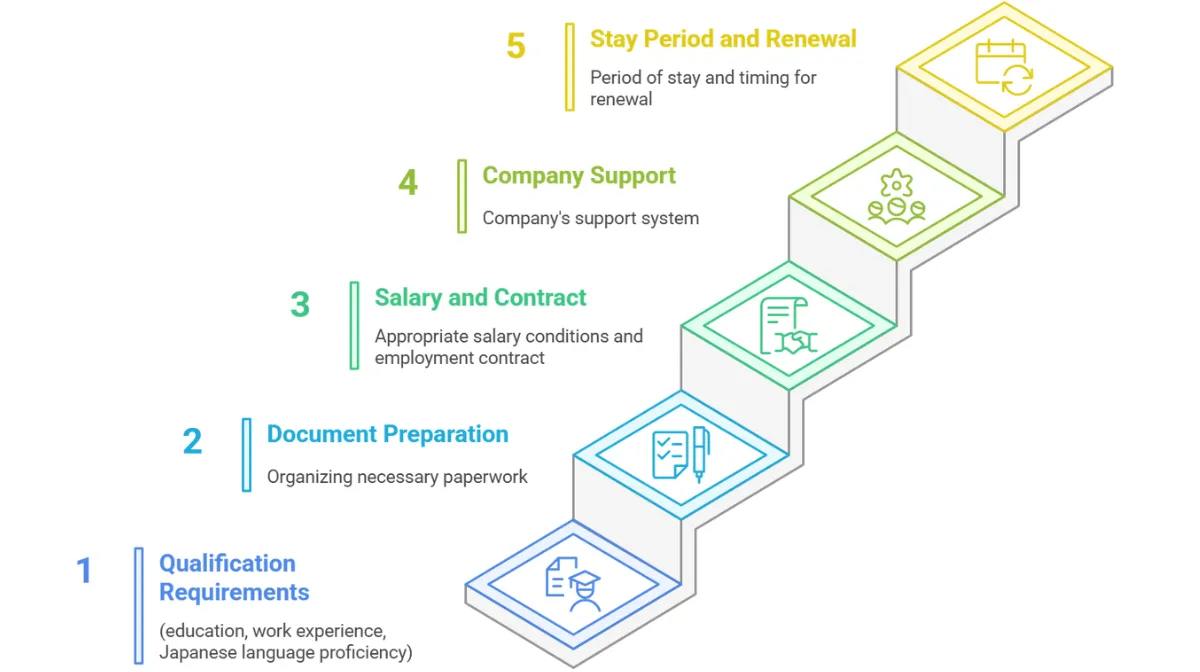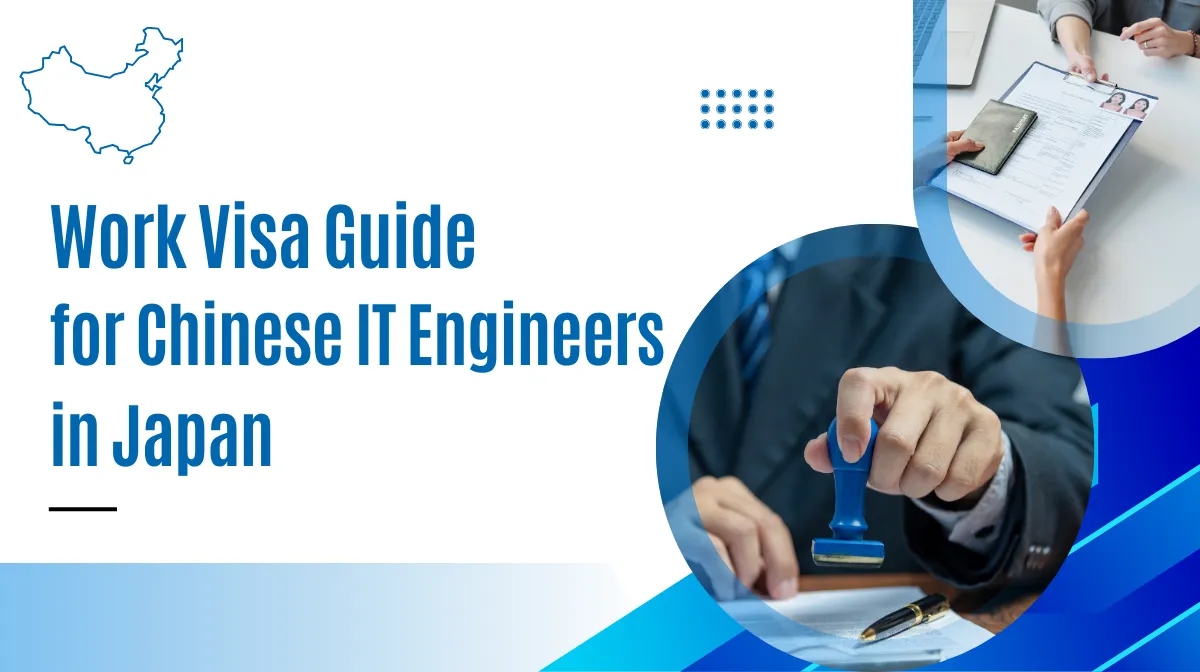The number of Chinese engineers working in Japan’s IT industry is increasing every year. However, obtaining a work visa requires navigating complex requirements and procedures.
This article provides a detailed explanation of the process of applying for and obtaining a work visa for Chinese engineers looking to work in Japan, based on practical experience.
We hope this serves as a useful reference for Chinese engineers aiming to work in Japan.
- How to obtain a Japanese work visa as a Chinese IT engineer.
- Common visa rejection reasons and countermeasures.
- Path to permanent residency in Japan.
1. Current Status and Challenges for Chinese IT Engineers in Japan

The presence of Chinese engineers in Japan’s IT industry has been growing steadily year by year.
Currently, there are approximately 820,000 Chinese residents in Japan, making them by far the largest group among foreign residents. This number continues to increase annually, highlighting their importance as vital talent in Japan’s IT industry.
Reference: Immigration Services Agency of Japan: Foreign Resident Statistics
Demand and Roles for Chinese Engineers in the IT Industry
Against the backdrop of a serious talent shortage in Japan’s IT industry, demand for highly skilled Chinese engineers continues to rise.
Chinese engineers are particularly prominent in system development and maintenance fields, excelling in web application development, mobile application development, and infrastructure design.
In data science and AI development, they play important roles in building machine learning models and analyzing big data.
In cloud computing, they demonstrate high expertise in cutting-edge technical areas such as cloud architecture design and microservice development.
Types of Residence Status and Selection Criteria
The most common residence status for IT engineers is “Engineer/Specialist in Humanities/International Services.” This status requires relevant IT education or practical experience and allows for a maximum stay of 5 years.
For engineers with more advanced expertise, there is also a “Highly-Skilled Professional” residence status.
This is granted based on a points system evaluation and offers benefits such as a longer period of stay and relaxed work restrictions for spouses.
When selecting a residence status, it’s important to choose the most suitable option considering your career plans and family situation.
Reference: Immigration Services Agency of Japan: “Engineer/Specialist in Humanities/International Services” and “Highly-Skilled Professional” (Points-based System)
2. Five Critical Points for Work Visa Applications

To successfully obtain a work visa, you need to meet several important requirements.
Below, we’ll explain in detail the five critical points for successful applications. By properly meeting these requirements, you can significantly improve your chances of success.
Qualification Requirements for Engineer/Specialist in Humanities/International Services
To obtain the Engineer/Specialist in Humanities/International Services residence status, you first need to meet educational requirements, such as graduating from a relevant department like information engineering or computer science.
If you don’t meet the educational requirements… you’ll need at least 10 years of practical experience. Technically, practical programming language experience and knowledge of system development and design are essential.
Since employment at Japanese companies is assumed, typically JLPT N2 level or higher Japanese language proficiency is recommended. These requirements are evaluated from both practical ability and theoretical knowledge perspectives.
Reference: Japanese Language Proficiency Test (JLPT)
Required Documents and Preparation Checklist
Work visa applications require document submissions from both the applicant and the employing company.
Documents to be submitted by the applicant
- Certificate of Eligibility application form
- Passport copy
- Identification photo
- Resume
- Degree certificate or work experience certificate
Meanwhile, the company needs to submit an employment contract, company registration certificate, materials explaining the business activities, and salary payment certificate.
These documents are important materials that prove the applicant’s qualifications and the suitability of the accepting company.
Reference: Documents Required for “Engineer/Specialist in Humanities/International Services”
Important Points Regarding Salary Conditions and Employment Contracts
Regarding salary conditions, it’s required to ensure a level equal to or higher than Japanese employees, with a general guideline of an annual income of at least 3.5 million yen recommended.
The employment contract must clearly state the job duties and include detailed information about conditions such as overtime pay and benefits.
These conditions serve to ensure appropriate treatment of foreign engineers and prevent employment under unfair labor conditions.
Company Reception System and Practical Experience
Companies are required to demonstrate stable management and appropriate working environments. Establishing a technical guidance system is particularly important, showing that there are support systems in place for training foreign engineers.
When proving practical experience, it’s important to clearly show specific project achievements, details of technologies used, and the roles and responsibilities handled.
This information serves as important evaluation criteria for assessing specialization and practical capabilities as an engineer.
Residence Period and Timing of Renewal Applications
The initial residence period is typically granted for 1 or 3 years, with highly skilled professionals eligible for up to 5 years.
Residence period renewal applications can be made from 2 months before the expiration date, and it’s necessary to prepare required documents and organize performance materials by this time.
During renewal, activity achievements during the residence period and future activity plans are also important evaluation criteria. Planned preparation and proper timing of applications lead to smooth residence period renewals.
Reference: Immigration Services Agency of Japan: Application for Extension of Period of Stay
■日本でエンジニアとしてキャリアアップしたい方へ
海外エンジニア転職支援サービス『 Bloomtech Career 』にご相談ください。「英語OK」「ビザサポートあり」「高年収企業」など、外国人エンジニア向けの求人を多数掲載。専任のキャリアアドバイザーが、あなたのスキル・希望に合った最適な日本企業をご紹介します。
▼簡単・無料!30秒で登録完了!まずはお気軽にご連絡ください!
Bloomtech Careerに無料相談してみる
3. Risks of Application Rejection and Countermeasures

There are several important risk factors in work visa applications. By understanding these risks in advance and taking appropriate countermeasures, you can improve your application success rate.
Particularly for first-time applications, special attention must be paid to the factors shown below.
Common Reasons for Rejection and Specific Examples
The main reasons for work visa application rejections include
Incomplete application documents
Omissions, errors, or missing required documents can lead to rejection even if other conditions are met.
Lack of specialization
If IT-related education or experience is insufficient, or if the planned job duties are deemed to lack specialized technical content, the application is likely to be rejected.
Salary condition issues
Large salary disparities compared to Japanese employees in the same workplace or employment conditions below minimum wage standards are common reasons for rejection.
Reference: Immigration Services Agency of Japan: Examples of Rejected Applications
Advance Countermeasures and Key Points for Application Documents
Thorough preparation in advance is essential to increase the success rate of applications. It’s recommended to consult with specialists before applying to confirm whether your conditions meet the requirements.
For submitted documents, they should be checked by multiple people to ensure there are no omissions or errors. When preparing documents, it’s particularly important to focus on specific descriptions of your specialization.
By explaining your project achievements and technologies used in specific and detailed ways, you can emphasize your specialization as an engineer.
Also, pay attention to the consistency of your educational and employment history, carefully checking to ensure there are no gaps or contradictions in your background.
4. Important Considerations and Continuing Requirements After Obtaining a Work Visa

Obtaining a work visa is not the end goal; proper management and procedures are required afterward. To continuously maintain your residence status, compliance with laws and regular renewal procedures are essential.
When considering career changes or changing jobs, you also need to carefully consider the impact on your residence status.
Continuation and Renewal Procedures for Residence Status
Actions after obtaining a work visa
- You are required to carry your residence card at all times
- If your address changes, you must report it within 14 days
- Regarding employment status… regular reporting is required, and prompt notification is necessary especially if there are significant changes in employment conditions or job duties
- At renewal time… you need to prepare multiple documents showing your activity achievements during the residence period and materials related to future employment plans
Neglecting these procedures could cause problems at the next renewal, so planned compliance is important.
Reference: Immigration Services Agency of Japan: Application for Extension of Period of Stay
Impact on Residence Status When Changing Jobs
When changing jobs within the same IT industry, you generally don’t need to change your residence status, but you must submit a notification of change of affiliated organization within 14 days.
However, if you’re considering a job change to a different industry, you need to carefully confirm whether the new occupation corresponds to activities permitted under your current residence status.
As you may need to apply for a change in residence status if necessary, it’s recommended to consult with the immigration bureau or specialists in advance when considering a job change.
■日本でエンジニアとしてキャリアアップしたい方へ
海外エンジニア転職支援サービス『 Bloomtech Career 』にご相談ください。「英語OK」「ビザサポートあり」「高年収企業」など、外国人エンジニア向けの求人を多数掲載。専任のキャリアアドバイザーが、あなたのスキル・希望に合った最適な日本企業をご紹介します。
▼簡単・無料!30秒で登録完了!まずはお気軽にご連絡ください!
Bloomtech Careerに無料相談してみる
5. Relationship Between Career Advancement and Visas for IT Engineers

To build a long-term career in Japan as an IT engineer, it’s important to manage your residence status while simultaneously advancing your career.
Particularly if you’re considering obtaining permanent residency, planned career development is required.
Path to Permanent Residency
To obtain permanent residency, in principle, you need at least 10 years of residence history.
Additionally, you must prove your record of compliance with laws as a conduct requirement and demonstrate your ability to maintain a stable income.
However, if you’re recognized as a highly skilled professional, the residence period requirement may be significantly shortened.
In this case, factors such as education, work history, and annual income are evaluated on a points system, with preferential treatment applied if you exceed a certain number of points.
In particular, acquiring cutting-edge technologies and advanced specialized qualifications are evaluated as additional points.
Reference: Immigration Services Agency of Japan: Permanent Residence Application
Stabilizing Residence Status Through Skill Improvement
Continuous skill improvement is essential to increase your value as an engineer and maintain a stable residence status.
Specific skill improvement plans include: obtaining IT-related certifications, learning new technologies, and accumulating practical project experience.
For career paths, you can choose to further deepen your specialization in technical areas or consider transitioning to management positions, depending on your individual aptitude and goals.
Furthermore, after accumulating sufficient experience and achievements, entrepreneurship can also be considered as an option.
Career choices directly affect the stability of your residence status, so planning from a long-term perspective is important.
6. Many Chinese Engineers Successfully Obtain Japanese Work Visas and Thrive
Obtaining a work visa is an important first step in a Chinese IT engineer’s career in Japan.
While meeting the requirements at the time of application is important, continuous skill improvement and proper management of your residence status afterward are the keys to success.
By understanding the five points explained in this article and creating a long-term career plan, you can expand your opportunities to thrive as an IT engineer in Japan.

















